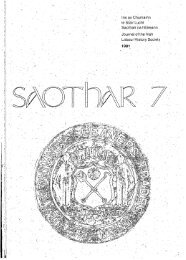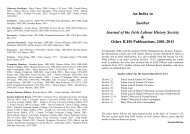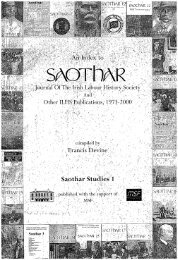52 SAOTHAR 13of Ireland' and vice versa, served to conflate two analytically distinct problems, namely the struggleto establish nation states, one of the historical bourgeois tasks of the epoch of capitalism, and thestruggle to establish international socialism. True, Connolly developed this schema ina creativeattempt to deal with what he understood to be the global changes in capitalist society and the newrealities this created for socialists in Ireland. However, this theory had the potential to surrenderworking class independence of nationalism in any joint struggle with nationalists against colonialoppression by an imperial power. .He believed that the 'thoughtful patriot' would see the necessity for socialism, but he explicitlyexcluded the Irish bourgeois nationalist reformers from this category, believing in his first Irish periodthat theirs was, after Parnell, a 'dissolving view'. When the Home Rule movement gained a newascendancy, in his second Irish period from 1910 till after the Lockout in 1914, Connolly' s perspecti veleft him tactically disarmed on the burning question of the day and the initiative on national independenceremained in the hands of the native capitalist class organised behind Redmond' s banner. He wasequally disarmed in his tactics when initiative passed to the conspiracy by revolutionary nationalistswhose bourgeois class character was covered over, in Connolly's historiography. Connolly believedthat their willingness to struggle automatically placed militant nationalists in the historic camp of thetoiling masses. 3Connolly's adaptation to nationalism thus dates not to 1914 but from his early ISRP period, whenhe equated the struggle for the Irish nation with the struggle of 'Labour' in Irish history and placed thenational question in the 'maximum' programme as against the orthodoxy of the International which putit in the 'minimum' programme of tasks achievable under capitalism. Indeed, his action after1914might even be construed as something of a turn in the opposite direction. After all, Connolly did notcollapse into social chauvinism in August 1914 as did Hyndman in Britain and Karl Kautsky, etc.,internationally. This is the reason why Greaves argues that Connolly was as close to Lenin as one couldget. But, of course, it is not quite that simple either.Connolly's schema for the Irish Revolution was operative in the 1914-16 period. This time,however, it led Connolly to subordinate politically the strategic aim of independent and class-widemobilisation of workers (in strike action against the war) to a national rebellion. While Morgan selects'Germanophile' references from Connolly during this period, he overlooks the context and alsoConnolly's theoretical position on Imperialism. For Connolly, the European War was about England's·control of the seas, not an inter-imperialist war in which the German, French, Russian and Austrianempires were attempting to redivide the globe. Therefore, Connolly identified the defeat of Englandas the only hope for post-war expansion, industrialisation and the rebirth of the socialist movementinternationally. This strategic consideration became dominant only after he saw the major collapse ofSocial Democracy into imperial chauvinism. .It was Connolly's tragedy that the working class had been badly mauled in the 1913-14 Lockout,with the resultant sharp fall in ITGWU membership. He was faced with the further blow of economicconscription draining workers away to the war. Theonly aUies hecould identify were the IRB elementsof the Irish Volunteers, though he was ready to go it alone with the Citizen Army into open Rebellionagainst England if all else failed.Connolly's role from 1914 to 1916 was geared increasingly towards insurrection, the focus of hisplans being the Citizen Army. Although he worked to rebuild the ITGWU he was concerned by whatappeared to be a receding opportunity to deal a blow to British Imperialism. This contrasted withLenin's view of the war which, he correctly estimated, would eventually overcome the initiallyheightened chauvinist illusions of workers and peasants and change the mood of the masses in adirection favourable to his policy of 'defeatism' towards their own imperialist ruling class. ConnoUy,by contrast held the view expressed in the International which believed an all-out strike in all belligerentcountries could prevent the war from being undertaken - that the declaration of war should have beenthe tocsin for the workers' revolution. This view was proven to be abstract and inoperable, thoughConnolly does not exactly admit this when he refocuses his politics after the collapse of the
ESSAYS IN REVIEW53International:'I believe that the war could have been prevented by the socialists; as it was not and all the issues arelcnit1 want to see England beaten so thoroughly that the comnierce of the seas will be free to all nations, thesmallest equally with the greatest. '4Hence the focus of his attention switched from working:c1ass action against the war to the task of strikinga blow against the principal enemy, the monopolist of world trade and oppressor of Ireland. Hisperspective; however, was the same as that which grounded his call for an Irish Labour Party in 1912when Home Rule seemed a peaceful inevitability, i.e., a future independent Ireland in whichsyndicalism and socialis'm could re-emerge as a force.Such. a mixture of views reflected Connolly's location among the various currents in the crisiswrackedinternational Social Democracy. However, despite his different and weaker understanding ofthe dynamics of an imperialist war, as compared with Lenin, it would be wrong to conclude thatConnolly abandoned his syndicalism and socialism and his general commitment to internationalism.These remained in spite of his clear adaptation to revolutionary nationalism during the war, placing him,therefore, in the 'left-of-centre' in the spectrum of the Second International. Although it would bedifficult to argue that his centrist politics would have led him inexorably towards the right, he seriouslycompromised his socialism to the extent that he subordinated his politics to the propaganda and theconspiracy ofthe radical nationalists. He resorted to purely insurrectionary methods, isolated from anystrategy for revolution. behind the backs of the workers' organisations. In doing so he liquidatedpolitically any objective expression of working class independence other than the separate organisationof his workers' militia. There is no expression whatever of distinct working-class interests in theproclamation of the Rising. B ut to say that he thus became a revolutionary nationalist is wide of themark. Morgan lapses somewhat crudely when he asserts that: 'The Dublin insurgents, Connollyincluded, were opposed to over seven centuries of British domination, not to the havoc capitalism hadcreated across the globe.' (p. 10)Morgan's book deserves a qualified welcome. The book aims to 'demythologize' Connolly, andas a new biography pitched against received wisdom, it contains many suggestive remarks and somenew perspectives. But it is disappointing because the assertion contained is not thoroughly backed upin the main body of the work. The source of this problem is that Morgan does not treat the corpus ofConnolly's political ideas, and their bearing on his practice, wi th the seriousness they deserve. Withoutthis it is impossible to come fully to grips with the enigma of the founder of Irish Marxism.NotesJoe Larragy1. C.D. Greaves, The Life and Times of James Connolly, (London. 1976, cd), p. 78.2. See HenryCollins, 'The Marxism oftheSDF' in A. Briggs and 1. SaviIle (eds.), Essays in Labour f1istory. Vol.2. (London. 1971).3. For an extended critique ofConnoIly's historiography see Irish Workers' Group, ClassStruggle.i5. Dublin,March, 1985.4. international Socialist Review. March, 1915.
- Page 1 and 2:
JOURNAL OF THE IRISH LABOUR HISTORY
- Page 3 and 4: ContentsPageEditorial: Labour Histo
- Page 5 and 6: EDITORIAL 3freedom to participate i
- Page 7 and 8: CorrespondenceThe Irish Labour Part
- Page 9 and 10: ; ~ ; ,The Decline and Fall of Donn
- Page 11 and 12: THE DECLINE AND FALL OF DONNYBROOK
- Page 13 and 14: THE DECLINE AND FALL OF DONNYBROOK
- Page 15 and 16: ·' THE DECLINE AND FALL OF DONNYBR
- Page 17 and 18: THE DECLINE AND FALL OF DONNYBROOK
- Page 19 and 20: THE DECLINE AND FALL OF DONNYBROOK
- Page 21 and 22: THE DECLINE AND FALL OF DONNYBROOK
- Page 23 and 24: THE DECLINE AND FALL OF DONNYBROOK
- Page 25 and 26: ,'-,;-''''.A PASSAGE TO BRITAIN 23C
- Page 27 and 28: A PASSAGE TO BRITAIN 25only in the
- Page 29 and 30: A PASSAGE TO BRITAIN 27clothing._De
- Page 31 and 32: A PASSAGE TO BRITAIN 29established
- Page 33 and 34: ;:-.",.- .. .", ...... '.:. '
- Page 35 and 36: LOUIE BENNETI 33feminist movement w
- Page 37 and 38: :... ~: ."
- Page 39 and 40: -.- '.LOUlE BENNETT 37While there i
- Page 41 and 42: LOUIE ~ENNEIT 39Xl's encyclical Qua
- Page 43 and 44: LOUIE BENNEIT 41Bennett's own relat
- Page 45 and 46: LODIE BENNETT 43109; IWWU resolutio
- Page 47 and 48: Essays in ReviewCosherers, Wanderer
- Page 49 and 50: ••• .".'. >. '~"ESSA YS IN RE
- Page 51 and 52: ESSAYS IN REVIEW 49ConnolIy:Myth an
- Page 53: ESSAYS IN ~EVIEW 51tion' in the Int
- Page 57 and 58: REVIEWScontroversy is real history.
- Page 59 and 60: REVIEWSJoe Monks was among the earl
- Page 61 and 62: REVIEWSnolly-Column Song','Proudly
- Page 63 and 64: REVIEWSresulting from the arrival o
- Page 65 and 66: REVIEWS,63the book by means of an a
- Page 67 and 68: REVIEWSlogue, it is hardly surprisi
- Page 69 and 70: The Team For All Workers ...CULIAIB
- Page 71 and 72: ESSAYS 69mission and moral refonn.l
- Page 73 and 74: .. ...... ~.~ -~ .'- '.ESSAYS. 71fr
- Page 75 and 76: ESSAYS 73claimed authority but whic
- Page 77 and 78: ESSAYS 75provided the basis for soc
- Page 79 and 80: ESSAYS 779. For comparisons see E.T
- Page 81 and 82: ESSAYS 7952. Annals of Christ Churc
- Page 83 and 84: ESSAYS' 81Fianna Fail and the Worki
- Page 85 and 86: ESSAYS 83Eireann in 1925 visibly di
- Page 87 and 88: ESSAYS 85recognition of the impract
- Page 89 and 90: ESSAYS 871970, it created the condi
- Page 91 and 92: ESSAYS89The Irish Immigrants' Contr
- Page 93 and 94: ESSAYS" 91Although anti -Catholic p
- Page 95 and 96: ESSAYS 93McCowie played a key role
- Page 97 and 98: :. -,,'.' ',. .~.,:.ESSAYS 95Althou
- Page 99 and 100: ESSAYS 97young girl of their own ba
- Page 101 and 102: SourcesIrish Labour History Society
- Page 103 and 104: SOURCES 101INovember, 1971 to no. 1
- Page 105 and 106:
SOURCES 103would claim credit for t
- Page 107 and 108:
SOURCES105Sources for Irish Labour
- Page 109 and 110:
SOURCES 107NorthWest Archives and L
- Page 111 and 112:
SOURCES 109In 1966 the Finnish gove
- Page 113 and 114:
TURNINGANEWLEAFThe CPSSUis the larg
- Page 115 and 116:
REMINISCENCE 113us due to my politi
- Page 117 and 118:
REMINISCENCE 115when Jim was presen
- Page 119 and 120:
REMINISCENCE 117of Dail Eireann. 17
- Page 121 and 122:
REMINISCENCE 119NotesThe above arti
- Page 123 and 124:
DOCUMENT STUDY 121James Connolly in
- Page 125 and 126:
DOCUMENT STUDY123SOCIAL DEMOCRATIC
- Page 127 and 128:
DOCUMENT STUDY 125proletariat of th
- Page 129 and 130:
DOCUMENT STUDY 127the support of Je
- Page 131 and 132:
DOCUMENT STUDY 12926. The Workers'
- Page 133 and 134:
131BibliographyA Bibliography of Ir
- Page 135 and 136:
BIBLIOGRAPHY 133Compton, P.A. Demog
- Page 137 and 138:
BIBLIOGRAPHY 135Levine, I. and Madd
- Page 139 and 140:
BIBLIOGRAPHY 137Turner, M. 'Towards
- Page 141 and 142:
BIBLIOGRAPHY 1394. Land and Agricul
- Page 143 and 144:
BIBLIOGRAPHY 141Clogher Record12 (2
- Page 145 and 146:
BIBLIOGRAPHY 143Political Research
- Page 147 and 148:
BIBLIOGRAPHY 145Pres, 1987.O'Brien,
- Page 149 and 150:
147Notes on Contributorsf onathanBe
- Page 151 and 152:
1901: Ireland's first general union
- Page 153 and 154:
ELECTRICAL TRADES UNION .Establishe





